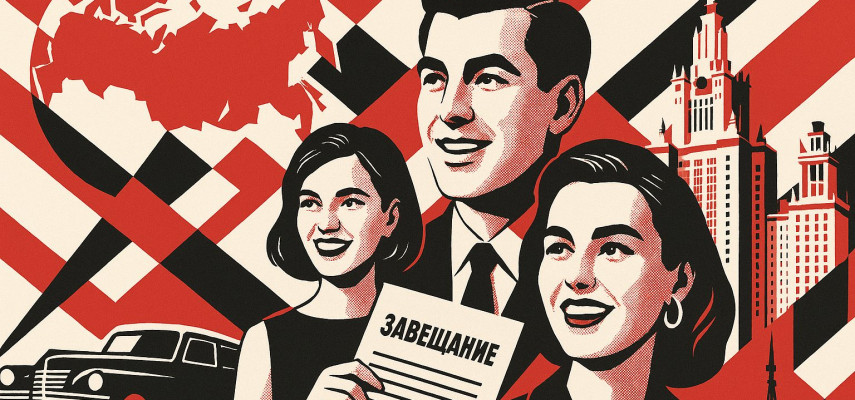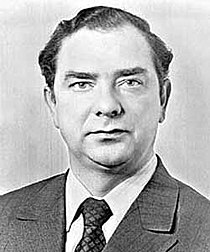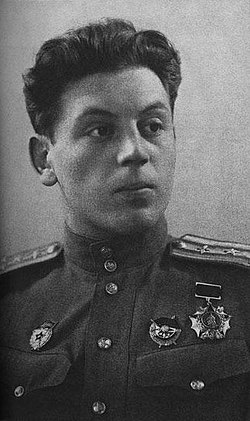
“Nomenklatura privileges are not inherited”
One of the myths protecting the wealth of the nomenklatura is the claim that, after their death, their children were left with almost nothing, while all the dachas and cars of their parents supposedly went back to the people. However, a closer look reveals that the children of nomenklatura members rarely ended up working in factories; instead, they usually moved into high-ranking positions, closer to the sources of privilege.
Defenders of Stalin’s system of socialism often list among its supposed advantages the claim that “nomenklatura privileges were not passed on to the next generation”. A typical example of this line of reasoning is:
And officials, apart from a salary comparable to that of a skilled worker, had only state-owned dachas and cars. An official could enjoy these “privileges” only while in public service. He could not sell them, pass them on to his heirs, or otherwise personally appropriate them without violating the Criminal Code1.
Such reasoning is pure demagogic manipulation. First, regarding the “salary comparable to that of a skilled worker”, we examined this issue in detail in this article. Second, the main charge against the nomenklatura concerns the existence of these privileges themselves, not their inheritance. Once the discussion shifts to inheritance, the red conservative is resorting to a classic demagogical trick: attributing to the critic a thesis they never held, a technique we analyzed here. The question of hereditary privileges is a completely separate issue, so when the argument of “non-inheritance” is invoked, it is really an attempt to obscure matters and “cover the tracks”.

Third, when Marxists make such claims, it must be pointed out that nowhere in Marxist theory is inheritance a necessary criterion for class. Exploitation depends on the circumstances of a given moment. If the son of an entrepreneur does not become an entrepreneur himself, does that mean, according to Marxist theory, that the father does not exploit workers? Such a claim has nothing to do with Marxist theory.
Fourth, the absence of direct mechanisms of inheritance in no way meant that the children of the nomenklatura were left deprived. Put simply, the scheme worked like this: suppose Ivan Ivanovich is Minister of Defense, and Sergey Sergeyevich is General Director of an automobile plant. Ivan Ivanovich’s son cannot become Minister of Defense, and Sergey Sergeyevich’s son cannot become head of the auto plant, since that would look improper. But this posed no difficulty: Ivan Ivanovich would advance his son’s career within the automotive industry, while Sergey Sergeyevich would promote his son in the Ministry of Defense. A similar practice, it must be said, still persists in the Russian Federation today.
As for specific examples, Leonid Brezhnev’s son, Yuri, by his early thirties was already director of the Karl Liebknecht Plant in Dnepropetrovsk; at forty-three he became Deputy Minister of Foreign Trade, and at forty-eight he was elected candidate member of the Central Committee2. According to Mikhail Voslensky, “the press was impressed by only one of his foreign trade exploits — when, overcome by the sight of truly enchanting dancers in the expensive Paris strip club Crazy Horse, he tipped a waiter 100 dollars — at the unofficial Soviet exchange rate of the time, 400 rubles3” (the average worker’s monthly wage at that time was about 140 rubles).

Aleksei Kosygin’s daughter, Lyudmila Gvishiani, was appointed director of the State Library for Foreign Literature. Andrei Gromyko’s son, Anatoly, by the age of twenty-nine had already become First Secretary and Counselor at the Soviet Embassy in the United Kingdom of Great Britain and Northern Ireland4 Later he became director of the Institute for African Studies of the USSR Academy of Sciences, although, as Voslensky remarked, “by that time, all he knew about Africa was that it existed”5. Igor Andropov served as Soviet ambassador to Greece, and “after a series of failures in this post was promoted to become a ‘special envoy ambassador’”6. Revoliy Suslov, the son of Mikhail Suslov, became a Major General and served in the KGB of the USSR7. And so on.
But this pattern emerged not only in the late USSR, but already under Joseph Stalin. Vasily Stalin, known mostly for his drunken escapades, became a Major General at just 23, and before the age of 30 was promoted to Lieutenant General and appointed commander of the Air Force of the Moscow Military District8. Lazar Kaganovich’s poorly educated brother Mikhail was made People’s Commissar of the Defense Industry, while his younger brother Yuli became Deputy People’s Commissar of Foreign Trade. Andrei Zhdanov’s son, Yuri, was made a member of the CPSU Central Committee.
What helped nomenklatura children climb the career ladder? Let us take Sergei Beria as an example — Marshal of Artillery Pavel Kuleshov recalled him in an interview with «Krasnaya Zvezda»:
I never noticed any special talents in Sergei Beria. He would strut around in fancy foreign shorts, liked, as they now say, “to have a drink or two”, to have fun. But he advanced quickly in service and work. How? I think he knew how to present the successes of his team as his own. Under his command was Aleksandr Andreyevich Raspletin. He truly was — I will not hesitate to say — a genius in the field of radio engineering and electronics. He later became an academician, Hero of Socialist Labor, and a Lenin Prize laureate…9
It also deserves a separate article to examine how nomenklatura sons “fought” on the quietest sectors of the front, appropriating the combat sorties of others.
Yet securing a lucrative position was possible not only through inheritance. One could marry well. This is how Aleksei Adzhubei built his career — Khrushchev’s son-in-law (there was even a saying: “Don’t bother having a hundred friends, just marry like Adzhubei”). Associate Professor Aleksei Nikonov, for example, left his family and ignored party organization threats just to marry Molotov’s daughter, who was far from a beauty. Dzhermen Gvishiani, husband of Kosygin’s daughter, became an academician and Deputy Chairman of the State Committee on Science and Technology, and so on10. Yuri Churbanov, after beginning a relationship with Galina Brezhneva, made a dizzying ascent into the elite, becoming Deputy Minister of Internal Affairs and a candidate member of the CPSU Central Committee.
It is only in socialist realist novels that the children of regional party secretaries go to work in factories; in reality they enter the party and diplomatic apparatus. A skeptic would have a hard time finding an example of nomenklatura offspring ending up in a non-nomenklatura position or not marrying into the nomenklatura. And what happens to nomenklatura children after their parents die or retire? Nothing special. Of course, they will no longer be pulled by the ears into ever higher posts, but neither will they be cast out of the nomenklatura. And it is not even about influential friends of their parents still being alive: friendship within the nomenklatura class is very self-serving, so friends would hardly be bound to protect them. The key is that the nomenklatura class had already passed beyond the stage when, in the forward-thrusting crowd of declassed upstarts, everyone shoved each other with sharp elbows and during the Yezhovshchina gleefully pushed one another into the abyss. Since then the nomenklatura has developed class consciousness. It no longer lives by the principle “You die today, I’ll die tomorrow”, but feels its unity and thinks in terms of generations. Children must be well-placed, children must be in the nomenklatura — this unwritten rule secures the future of nomenklatura sons and daughters.
The ruling nomenklatura class in the USSR is increasingly shifting toward self-reproduction. Yes, a nomenklatura position is not inherited. But belonging to the nomenklatura class is, before our eyes, becoming practically hereditary11.
All this has only developed further, and to this day, under Vladimir Putin, the nomenklatura still lives by the motto “all the best — for the children” (their own, of course). The son of former head of the Presidential Administration Sergei Ivanov, Sergei Ivanov Jr., became the new head of the diamond mining company ALROSA12. He did not directly inherit his post, but, as you can see, he is not starving. Dmitry Patrushev, the eldest son of Security Council Secretary and former FSB head Nikolai Patrushev, became Chairman of the Board of Rosselkhozbank13. His brother Andrei Patrushev is Chairman of the Board of Directors of TsentrKaspneftegaz, a joint venture of Gazprom and LUKOIL14. The list could go on endlessly. For such figures, there is no need to inherit a piano or an old Mercedes from their father — they can afford to buy everything new. And in that case, the Stalinists will probably be satisfied.
The hereditary nature of the nomenklatura — the inheritance of belonging to the class — deprives truly talented people of the opportunity to occupy high positions, thereby improving the effectiveness of government and enterprises. This is one of the reasons for the low standard of living in Russia today, and it was one of the reasons for the low standard of living in the USSR. Combating this heredity must be pursued through nomenklatura lustration, the formation of genuinely democratic institutions of government, and independent media free from both big capital and state power.
- Viktor Pyzhikov. Whose Property Was It in the USSR? // «Krasnoyarskaya Pravda» (kras-pravda.ru). April 21, 2010, 23:40. [Electronic resource]. URL: http://kras-pravda.ru/blogs/pyzhikov/komu-prinadlezhala-sobstvennost–v-sssr.html (accessed: 29.11.2019).
- «Russia-2000: Faces of Russia» — A. I. Podberezkin, Spiritual Heritage (Organization), RAU-Corporation (Russia) — VOPD “Spiritual Heritage”, 2000.
- M. Voslensky. «Nomenklatura: The Soviet Ruling Class» (Second, revised and expanded edition), 671 pp. — Overseas Publications Interchange Ltd, London, 1990, p. 174.
- Nikolai Zenkovich — «The Most Secret Relatives».
- M. Voslensky. «Nomenklatura: The Soviet Ruling Class», 2nd ed., 671 pp. — Overseas Publications Interchange Ltd, London, 1990, p. 174.
- M. Voslensky. «Nomenklatura: The Soviet Ruling Class», Moscow, 1991.
- Nikolai Zenkovich — «The Most Secret Relatives».
- Vasily Stalin: A Hostage of the Name — Oleg Sergeyevich Smyslov. — “VEChE”, 2003 — 463 pp.
- Aleksandr Kochukov. Devastating Salvos of the “Katyushas”. On the 60th Anniversary of the Formation of the Guards Mortar Units // «Krasnaya Zvezda» (redstar.ru). September 7, 2001. [Electronic resource]. URL: http://old.redstar.ru/2001/09/07_09/2_01.html (accessed: 29.11.2019).
- M. Voslensky. «Nomenklatura: The Soviet Ruling Class» (Second, revised and expanded edition), 671 pp. — Overseas Publications Interchange Ltd, London, 1990, pp. 136–137.
- Ibid., p. 175.
- Evgeny Kalyukov. Trutnev Announced the Appointment of Sergei Ivanov’s Son as Head of ALROSA // RBC (www.rbc.ru). February 27, 2017, 13:11. [Electronic resource]. URL: https://www.rbc.ru/business/27/02/2017/58b3f8929a7947d25060e4f4 (accessed: 29.11.2019).
- Biography of Dmitry Patrushev // TASS (tass.ru). May 18, 2018, 15:45. [Electronic resource]. URL: https://tass.ru/info/5213120 (accessed: 29.11.2019).
- Daria Napeeva, Alina Fadeeva. Patrushev’s Son Became Head of the Board of Directors of Gazprom and LUKOIL Joint Venture // RBC (www.rbc.ru). March 1, 2017, 14:44. [Electronic resource]. URL: https://www.rbc.ru/business/01/03/2017/58b6abe99a7947f1a2310d9b (accessed: 29.11.2019).

